Wounding
This article is about the verb "wound," as in "wound a character." For the noun, as in "wound token", see Wounds
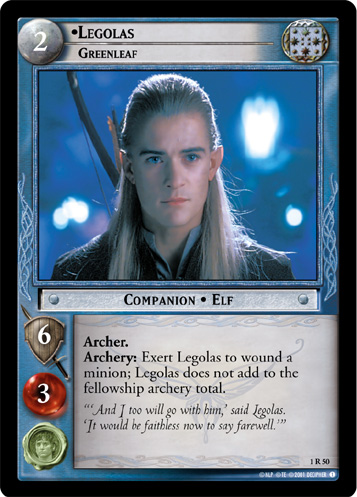
Wounding is the name for any way to place wound tokens on opposing characters other than skirmish resolution (the wound from winning a skirmish and any additional wounds from Damage bonuses). Although wounds and exertions are distinct, the term "wounding" can also used for effects which exert an opponent's characters. After all, there's no such thing as an "exert token": once a token is placed, it doesn't matter how it got there.
A strategy which primarily wounds with these effects is known as a wounding strategy or a wounding deck. An "archery deck" is a subset of wounding deck which uses archers and archery phase actions to do most or all of its wounding, while "grind" is used to describe more varied wounding decks which often have no archers at all. Strength is typically less important for wounding strategies than others, and they can win the game without winning a single skirmish: Free Peoples sides will aim to put out enough wounds that no minions make it that far, and Shadow sides will apply wounds regardless of skirmish outcomes. Even so, the Free Peoples in particular can't always afford to ignore strength entirely as various forms of wound prevention exist to protect minions.
Direct wounding is used to describe wounding which allows players to put wounds directly on an opposing character of their choice. The most notable examples since the first set have been Legolas, Greenleaf (1R50)
 and Aragorn’s Bow (1R90)
and Aragorn’s Bow (1R90)
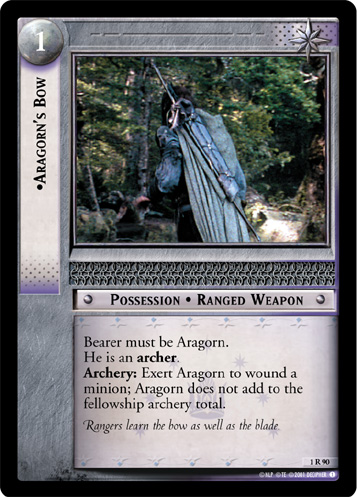 , and some players call direct wounding effects aimed archery or targeted archery because of them -- at times even when the wounding does not take place during the archery phase (especially when a bow is involved, such as Gondor Bow (7U94)
, and some players call direct wounding effects aimed archery or targeted archery because of them -- at times even when the wounding does not take place during the archery phase (especially when a bow is involved, such as Gondor Bow (7U94)
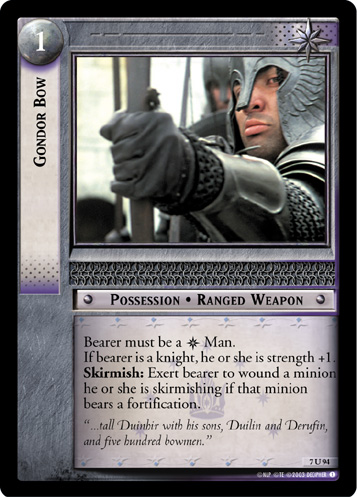 ) . Players who prefer to speak in terms of the wounds placed rather than the action that places them may call them directed wounds, and use directed wounding to describe the action as a result.
) . Players who prefer to speak in terms of the wounds placed rather than the action that places them may call them directed wounds, and use directed wounding to describe the action as a result.
Indirect wounding, by contrast, is wounding which makes an opponent put wounds on their own characters. Players "indirectly" wound opposing characters since, while their cards are the cause of the wounding, it was not ultimately their decision to wound a particular character. The archery total and the assignment of threat wounds are the most common sources of indirect wounding by far, but since these are core game mechanics rather than card effects they are usually simply called "archery" and "threats." As with direct wounding, some players refer to indirect wounding as unaimed/untargeted archery regardless of the phase. Players referring to the wounds themselves may call them undirected wounds, and the action undirected wounding.
Direct wounding is often more desirable while indirect wounding is often more accessible, so wounding strategies generally incorporate both. Sauron Grind decks, for example, use Under the Watching Eye (1C281)
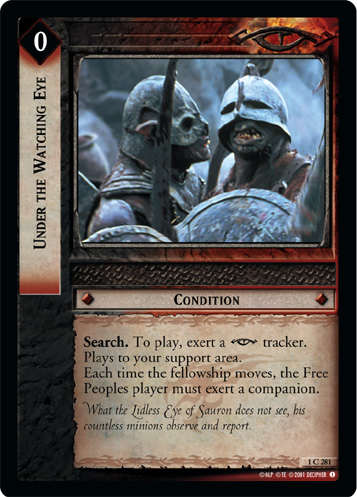 and Orc Bowmen (1R264)
and Orc Bowmen (1R264)
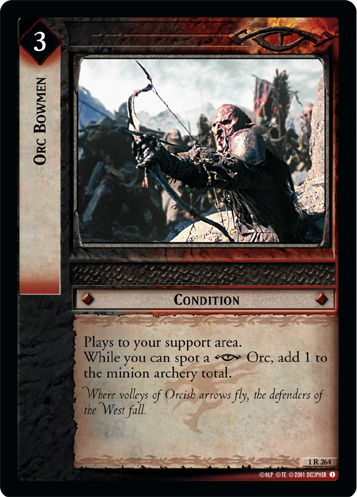 to constantly pepper the Free Peoples player until a companion has enough wounds to be killed by Hate (1R250)
to constantly pepper the Free Peoples player until a companion has enough wounds to be killed by Hate (1R250)
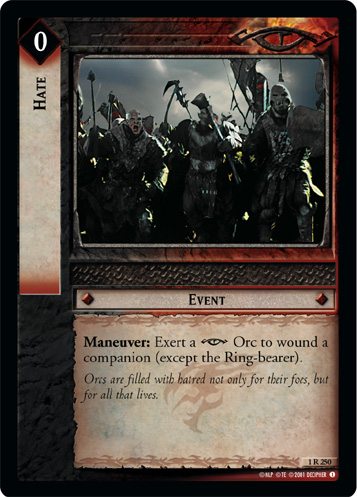 , or use a Hate drawn too early to bring companions closer to exhaustion so that the persistent archery from Orc Bowmen will force the Free Peoples player to kill companions later on.
, or use a Hate drawn too early to bring companions closer to exhaustion so that the persistent archery from Orc Bowmen will force the Free Peoples player to kill companions later on.